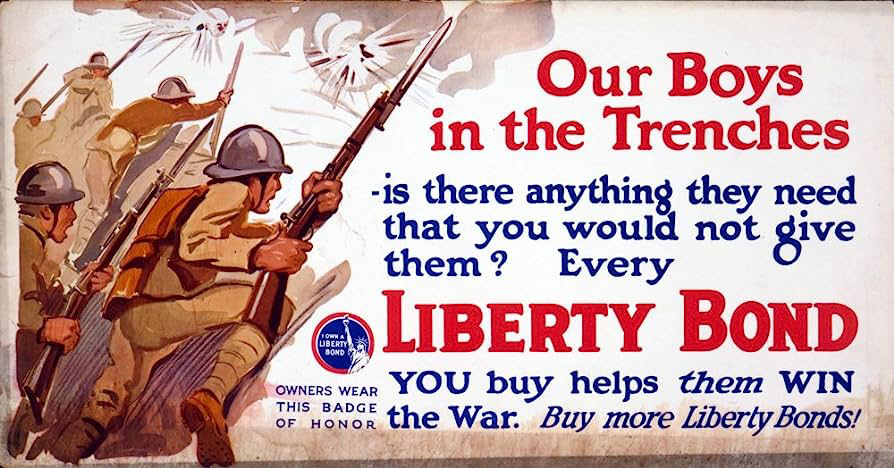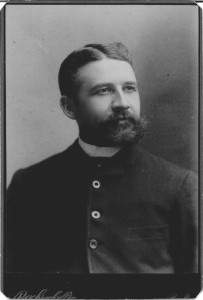Emmitsburg supports troops in the War to End All Wars

by James Rada, Jr.
The United States became involved in World War I when Congress declared war on Germany in April 1917. At that point, the war had already been fought in Europe and Africa for nearly three years.
The Weekly Chronicle ran editorials supporting the U.S.’s involvement and also began running articles that summarized the war events of the week.
The June 8, 1917, Chronicle ran a front-page display of the first area residents to join the military to fight in the war. Francis Elder, Joseph Felix, Joseph Adelsberger, Benjamin Topper, George Wagerman, Louis Stoner, Clarence Myers, Charles Sharrer, Carroll McCleaf, and Earl Weikert enlisted in Company A, First Regiment of the Maryland National Guard. Frank Bouey, Quinn Topper, and William Bowling enlisted in the Army, and Simon Klosky enlisted in the Aviation Corp.
Men began joining and being drafted into the military. The first batch of soldiers to ship out from the Emmitsburg area were Clarence Frailey, Daniel Brown, Clarence Baumgardner, Maurice Moser, Robert Hahn, John McMorris, Joseph Kreitz, Thomas Frailey, George Smith, Joseph Turner, Elmer Bailey, Clay Shuff, Edward Worthington, Morris Whetzel, and Charles Ohler. They were part of a group of 179 men who left Frederick County on September 16, 1917, as part of “Uncle Sam’s big new national army, to fight the Germans and Kaiserism and Hohenzollern intrigue,” according to the Chronicle.
To get the Emmitsburg men to the departure point, the Frederick County Exemption Board arranged for rail cars of the Hagerstown and Frederick Railway to convey all of the men from Frederick City to Thurmont to meet the Western Maryland Railroad train to Baltimore and eventually to Fort Meade.
“There was no fuss and feathers, there were no public ‘sad farewells’—at least on the part of Emmitsburgians—when these boys started on the first lap of their journey. They received their orders and, like the soldiers they are, obeyed them without a murmur, without a word of criticism. We feel assured that all of Frederick County’s assignment will be up to the standard; we know that the squad from here will give a good account of itself; for the personnel of that squad ranks A1. Each man in it has a clear conception of the responsibility that rests upon him, each man is much in earnest—determined to do his full share. These selectmen—that’s the name, and an honorable one—and also those from Emmitsburg who heretofore volunteered their services to their government, will not be forgotten by those who they have left behind,” the Chronicle reported.
On the home front, towns around the country help Liberty Loan drives to encourage people to buy war bonds to ensure the government had enough money to fight the war. During the third Liberty Loan drive, the Federal Reserve in Richmond asked Emmitsburg to raise $43,100. By the time the quota was received at the Emmitsburg Savings Bank, $47,000 had already been pledged.
Here’s how The Weekly Chronicle described a Liberty Loan rally in Emmitsburg on June 13, 1917, to encourage the purchase of war bonds to support the war effort.
“The big and very successful patriotic meeting held in the Square Wednesday night leaves no doubt as to the interest of the people of Emmitsburg in the effort of the Government ‘to make good’ the sale of Liberty Loan Bonds. More than five hundred people listened intently to the practical presentation of the bond question by C. T. Williams and George P. Bagby, Esq., of Baltimore, and the earnest forceful and patriotic appeal of Rev. J. O. Hayden, pastor of St. Joseph’s Church. It was an enthusiastic crowd that listened to the speakers, each of whom was time and again interrupted by rounds of applause.
“Through the courtesy of Mr. J. B. Elder the commodious porch of the Hotel Spangler was placed at the disposal of the Committee and before the introduction of the speakers by Mr. J. Stewart Annan, Burgess of Emmitsburg and between and after each speech the Emmit Cornet Band played enlivening patriotic airs. The porch of the hotel was appropriately decorated and on either side of the speakers a soldier in khaki held aloft the Stars and Stripes and the flag of Maryland. These ‘Boys’ representing the recruits from the district, the little band of true soldiers of which Emmitsburg is justly proud, were Louis Stoner and Frank Elder.
“The visiting speakers expressed themselves as being more than delighted by and impressed with the patriotic spirit shown here. They paid a high tribute to Frederick County’s response to the call and left with the assurance, gained by their own observation that Emmitsburg as it always does will more than do its ‘bit.’”
Besides supporting their soldiers by buying war bonds, the people of Emmitsburg remembered their husbands, sons, fathers, and brothers who were fighting for America. The Doughboy statue that stands at the intersection of Frailey Road and Route 140 lists 135 Emmitsburgians who served in the war, of whom nine died.


